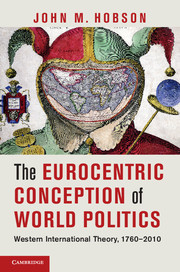Book contents
- Frontmatter
- Contents
- Figures
- Tables
- Acknowledgments
- 1 Introduction
- Part I 1760–1914
- Part II 1914–1945 The high tide of manifest Eurocentrism and the climax of scientific racism
- Part III 1945–1989 Subliminal Eurocentrism in international theory
- 8 Orthodox subliminal Eurocentrism
- 9 Orthodox subliminal Eurocentrism
- 10 Critical subliminal Eurocentrism
- Part IV 1989–2010 Back to the future of manifest ‘Eurocentrism’ in mainstream international theory
- Part V Conclusion Mapping the promiscuous architecture of Eurocentrism in international theory, 1760–2010
- References
- Index
10 - Critical subliminal Eurocentrism
Gramscianism and world-systems theory, c. 1967–1989
Published online by Cambridge University Press: 05 June 2012
- Frontmatter
- Contents
- Figures
- Tables
- Acknowledgments
- 1 Introduction
- Part I 1760–1914
- Part II 1914–1945 The high tide of manifest Eurocentrism and the climax of scientific racism
- Part III 1945–1989 Subliminal Eurocentrism in international theory
- 8 Orthodox subliminal Eurocentrism
- 9 Orthodox subliminal Eurocentrism
- 10 Critical subliminal Eurocentrism
- Part IV 1989–2010 Back to the future of manifest ‘Eurocentrism’ in mainstream international theory
- Part V Conclusion Mapping the promiscuous architecture of Eurocentrism in international theory, 1760–2010
- References
- Index
Summary
Introduction: critiquing capitalist imperialism, naturalizing Western domination
For many, the claim that much of neo-Marxist IR is Eurocentric will appear as entirely counter-intuitive given its association with the critique of imperialism on the one hand and Western capitalism on the other. But, as I noted in my earlier discussions of Karl Marx (pp. 52–8) and Vladimir Lenin (pp. 136–42), it is perfectly possible to be Eurocentric while at the same time being highly critical of the West. Modern neo-Marxist IR follows closely in the wake of Lenin’s brand of critical subliminal Eurocentrism, wherein the West is viewed as the supreme agent of world politics/economics that lies at the very centre of all things, while the East is denied progressive agency of any sort and is portrayed as a hapless down-and-out, condemned for the foreseeable future, if not for all eternity, to eke out a miserable existence in the ghetto of the periphery. And despite the different stances vis-à-vis imperialism nevertheless Marx’s paternalist Eurocentrism presents the East as a passive beneficiary of Western imperialism while modern neo-Marxist subliminal anti-paternalist Eurocentrism presents it as the passive victim of Western domination (as did Lenin).
My focus in this chapter is on world-systems theory (WST) and the ‘orthodox’ Marxism of Gramscianism, on the grounds that these were the dominant Marxist theories of IR and IPE before 1989. And, just as various orthodox Marxists in the 1970s critiqued dependency theory and WST for its alleged ‘bourgeois’ and hyper-structuralist properties (Laclau 1971; Brenner 1977), so Robert Cox differentiates his Gramscian theory from WST in not dissimilar terms. But the claim of this chapter is that while Gramscianism and WST are generically thought of as very different approaches, nevertheless when viewed through a non-Eurocentric lens they (re)appear as minor variations on a consistent anti-paternalist Eurocentric theme (as shown in Figure 10.1). In what follows I shall reveal how these Eurocentric categories infect both of these major Marxist theories.
- Type
- Chapter
- Information
- The Eurocentric Conception of World PoliticsWestern International Theory, 1760–2010, pp. 234 - 254Publisher: Cambridge University PressPrint publication year: 2012



